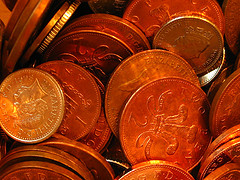Agora um exemplo interessante ocorreu na venda do grupo que publica o Wall Street Journal (Dow Jones) para o milionário Murdoch (clique aqui). Como o milionário tem a fama de transformar bons jornais em jornais sensacionalistas, a família dona do WSJournal relutou em vender o jornal.
Provavelmente Murdoch pagou um prêmio por ser Murdoch. Na revista Slate é feita uma análise sobre isto.
Como as ações estavam cotadas a 36,33 dólares em abril e a oferta de Murdoch foi de 60 por ação, a diferença é o prêmio pela empresa ou 65%. Mas como em todo o processo de aquisição é natural a existência de um prêmio em torno de 20 a 25%, talvez esta diferença seja o prêmio Murdoch. Gross estima, portanto, que o prêmio Murdoch deve ter sido em torno de 1 bilhão de reais. Um valor razoável pela "fama".
The Jerk PremiumHow much extra did Rupert Murdoch have to pay to buy Dow Jones, just because of who he is?
By Daniel Gross
How much extra did Rupert Murdoch have to pay to buy Dow Jones, just because he is Rupert Murdoch? When private equity firms and corporations buy other companies, they almost always pay a premium to gain control. But some pay more than others. All things being equal, a takeover offer from a proven value-creator like Warren Buffett wouldn't have to be as high as an offer from a proven value-destroyer like former AOL Time Warner CEO Gerald Levin. Sometimes a buyer's reputation is so toxic that sellers might charge a higher price to compensate for the icky feeling the transaction gives them. That sure seems to be the case with Murdoch's acquisition of the Wall Street Journal's parent company. What follows is an admittedly crude effort to calculate the Murdoch premium.
It's not unreasonable to assume that Murdoch would have had to pony up more for the Journal than another buyer such as the New York Times Co., or General Electric. Several heirs of the Bancroft family, which controlled the majority of the Dow Jones voting stock, fretted that he might turn their patrimony into Fox News in print, or a financial New York Post, or use media properties to advance his other business interests. Leslie Hill, a Dow Jones board member and Bancroft family member, worried that she and her cousins would squander their legacy even as they replenished their trust funds. But Murdoch had made an unsolicited offer so rich that executives, shareholders, and family members couldn't refuse to consider it. On April 30, Dow Jones stock closed at $36.33. On May 1, the company confirmed that Murdoch had bid $60 per share, or about $5 billion. That represented a huge 65.15 percent premium—and a price the stock hadn't seen since April 2002.
Calculating takeover premiums can be challenging since stocks sometimes run up on rumors of a deal. And the larger deals—for which there are generally fewer potential bidders—tend to receive smaller premiums. But during this bull market for buyouts, premiums have generally been in the range of 20 percent to 25 percent. The Bespoke Investment Group has data showing that the average premium was 24 percent in 2006, and 21.52 percent through June 2007.
Check out a few prominent examples. In February, when the Blackstone Group won a bidding war to buy Sam Zell's huge real estate company, Equity Office Properties, it paid a 24 percent premium to the pre-bidding price. The giant hospital company HCA, sold last November to a consortium of management and private equity firms in a $33 billion megadeal, went for an 18 percent premium. This morning, Fiserve announced it would buy Checkfree for $4.2 billion, a 30 percent premium. Yesterday, Marathon Oil offered to buy Canadian energy company Western Oil Sands Inc. for $5.45 billion, a 4 percent premium. These last two deals are roughly the size of the Dow Jones deal. According to Thomson Financial, the six other buyout deals between $5 billion and $6 billion so far this year have received an average buyout premium of 16.65 percent.
A more instructive comparison may be Sam Zell's purchase of the Tribune Company, whose trophy properties included the Los Angeles Times, Chicago Tribune, and Chicago Cubs. Zell bested two other bidders by offering a mere 11 percent premium to Tribune Co.'s price when it put itself up for sale last September. The low premium demonstrates the low regard investors have for newspaper companies. Here's a chart showing how the stocks of New York Times Co., Washington Post Co. (of which I'm an employee), Gannett, and the Tribune Co., have lost ground over the past year. Absent Murdoch's bid, Dow Jones would surely be bumping along with its fellow stragglers. On July 19, when Dow Jones reported second-quarter earnings, it noted that advertising revenue at the flagship U.S. edition of the Wall Street Journal fell 6.2 percent.
Given the dynamics in the industry, it's plausible to think that a company that is not News Corp.—that is, a company not synonymous with right-wing bias, shoddy journalism, and a meddling boss—could have taken Dow Jones for a 25 percent premium to the $36.33 per share price—$45.41 per share, or about $3.78 billion. Assume a more generous 40 percent premium—this is the Wall Street Journal, after all—and a non-Murdoch buyer could have bought Dow Jones for about $50.86 per share, or $4.24 billion. Again, this is highly speculative, but it's likely that Murdoch would not have won over the Bancrofts had he not put such a rich offer on the table.
So it's not unreasonable to assume that Murdoch was forced to pay somewhere between $760 million and $1.22 billion more for Dow Jones just because of his reputation.
If Murdoch weren't Murdoch, he wouldn't have had to pay so much to control the Wall Street Journal. But if Murdoch weren't Murdoch, he wouldn't have wanted to.

